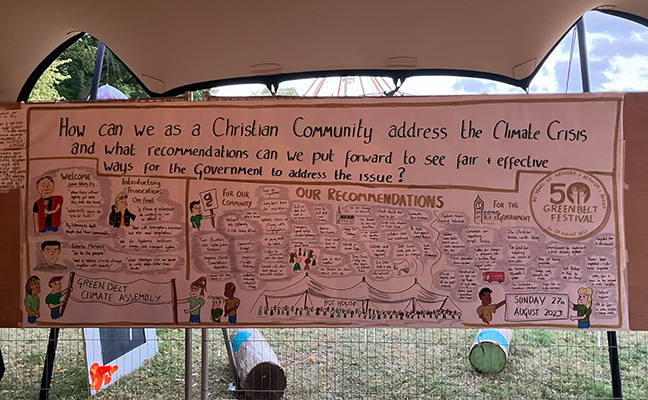Did you know? We hosted a participatory ‘Climate Assembly’ at this year’s festival. Thanks to Jamie Kelsey Fry, Clare Farrell and co. Here are the most popular outcomes from the assembly’s deliberations. Our hope is that they find their way to being acted upon by our community.
(Please note: we know ‘the church‘ is not a monolithic mass of institutional forms and people who all think the same. But for the purposes of these summary notes, we use the language of ‘the church’ as shorthand to cover the multitude of forms and faith represented across the Christian community.)
Energy and church resources
Churches as power stations. All churches to have solar panels on their roofs to provide energy for their community. Use the 3 million acres of church land to establish community-run food production cooperatives. Create emergency support groups for the thousands of climate refugees expected.
Assembly (Ekklesia)
Churches to run People’s Assemblies – to listen to each other and the wider community, find our common voice and decide on common action. Invite everyone, all communities and all faiths. Also use these to address our polarised society and focus on divisive issues like ULEZ. Church congregations should be doorstepping their communities to find out what their most important issues are. Not to dictate what their issues should be, but to start with listening. Then use Assemblies to act on these issues with the community. Start with easy wins, like sewage in our waterways. Use Climate Assemblies to make sure the brave climate activists are not being marginalised. Use well facilitated Assemblies for those voices who are not confident to speak, elevate the voice of the vulnerable or powerless. Hold these well facilitated Assemblies so that all people are safe to share their feelings and be vulnerable.
Voice
There are 2 billion Christian voices in the world. Church leaders need to galvanise a collective, global response to climate. Church communities to put forward youth voices on climate. Church communities need to be outrageous and no longer quiet about climate. They need to use these styles of Assembly to make sure they are not quiet. This has to be a bottom up movement, acting on the reality that we are all inter-relational beings.
Money
Tax the fossil fuel industry heavily and end all subsidising of the industry. Money saved goes into transition to renewables. Change legislation so that fossil fuel companies
and their shareholders ‘take the hit’, not ordinary people. All churches divest out of fossil fuels. Congregations are encouraged to switch to banks that don’t invest in fossil fuels.
Political power
Churches hold climate- focused hustings for electoral campaigns. Bishops in
the House of Lords use their position to fight for climate justice and against government inaction on climate change. Push through new regulations on housing and development so that all are not environmentally damaging. Make public transport affordable and efficient. It should be acceptable for politicians to make mistakes and admit they are fallible rather than keep up false pretences. Make all lifestyle choices towards being carbon-free an affordable choice. Create a Minister for Future Generations.
Theology
Challenge theology that ignores climate change (assuming and saying that ‘God will save us’).
Lifestyle choices
Switch banks to green banks. Switch diets to plant-based, vegan diets.
Special thanks also to Greenbelter and visual facilitator Jon Dorsett for his beautiful annotated note-taking (see the photo at the head of the blog)..


